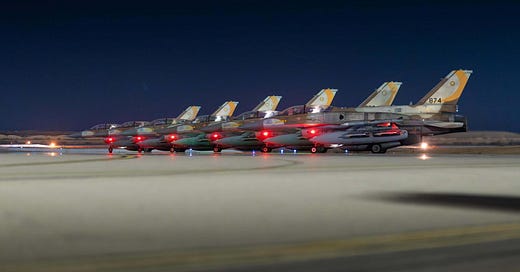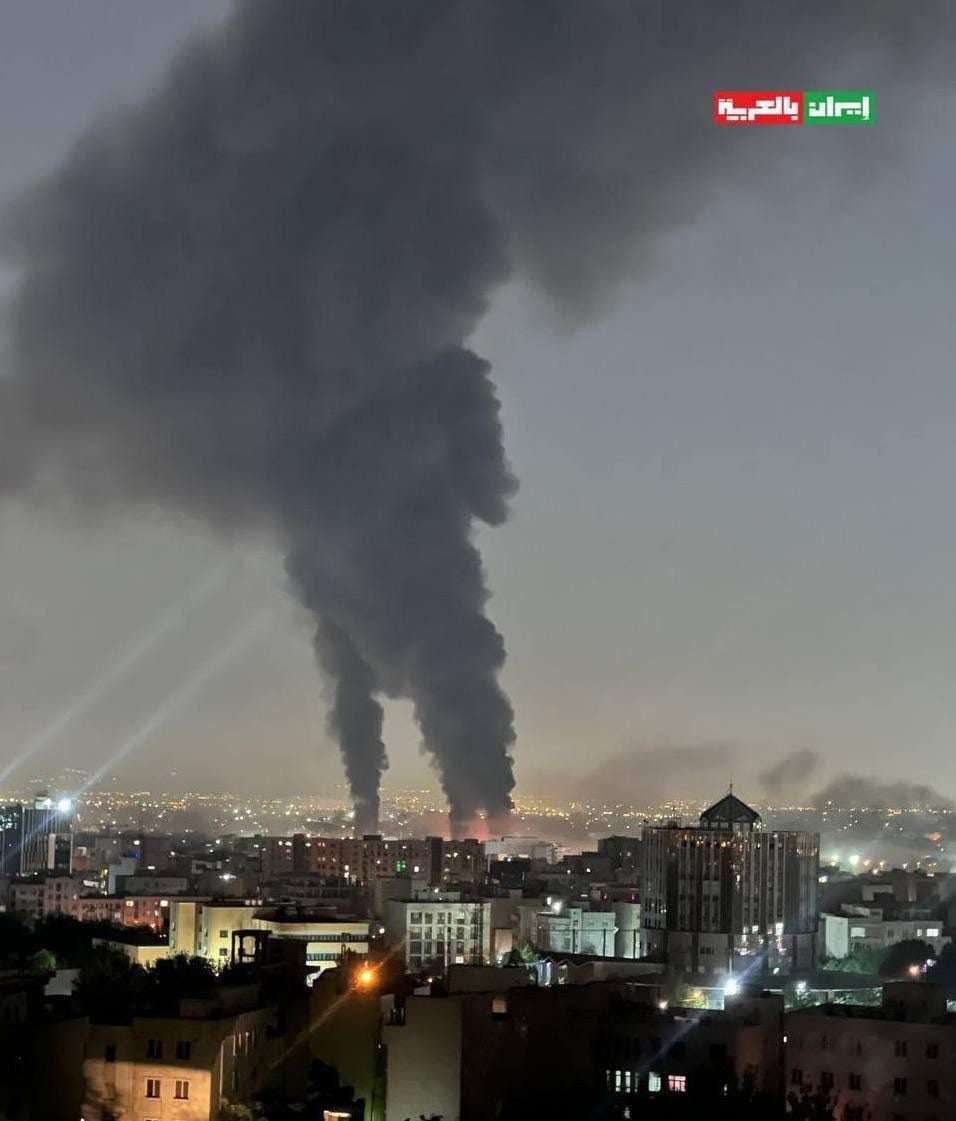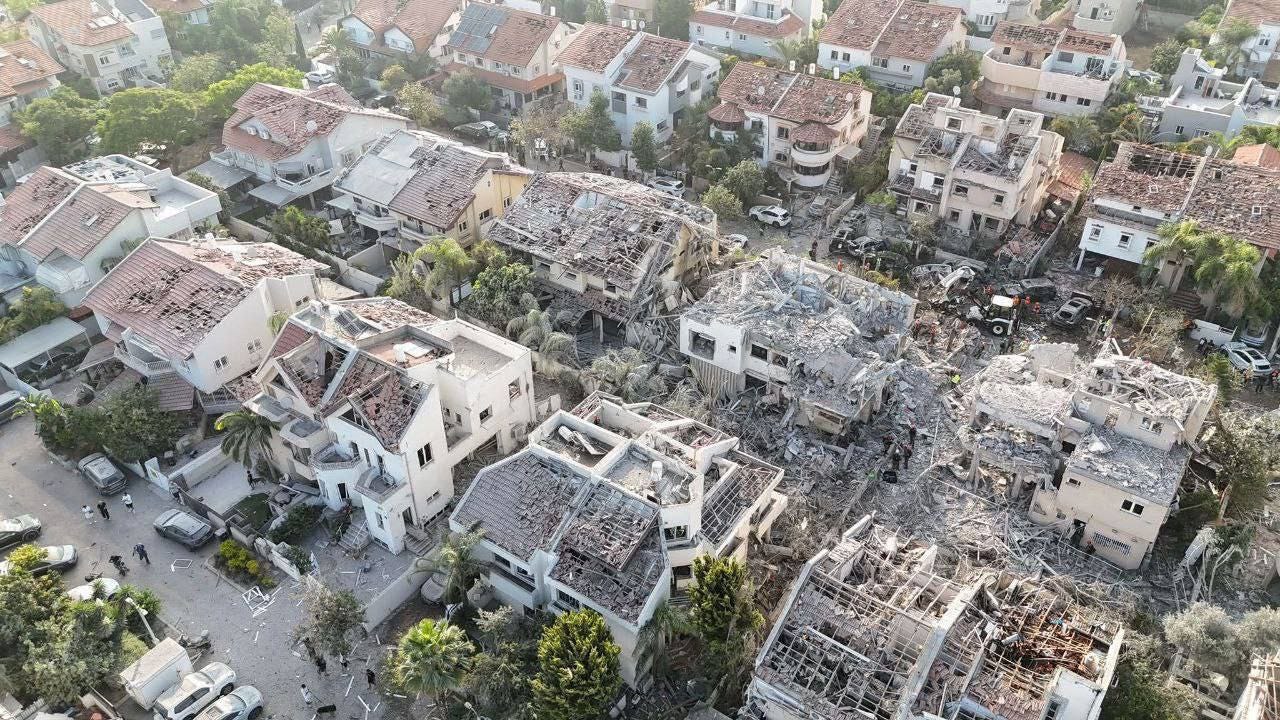What happened: On June 13, Israel launched a new operation dubbed “Rising Lion” against the Islamic Republic of Iran. We’re now more than 24 hours into an operation some have already dubbed a “war”, and while the dust has yet to settle, some key points are starting to emerge.
Israeli war planes involved in operation “Rising Lion”
Israel took Iran by surprise.
The first is Israel’s ability to take Iran by surprise, despite early signs of a possible attack. Whether it was coordinated or not, the fact that nuclear talks were still ongoing, and a round of talks in Oman still planned at the time, probably meant that Iran ignored signs that an attack was coming, including the partial evacuations of US Embassies in the region - signs I, myself, mistook as an attempt to pressure Iran. Iranians likely thought Israel would not act unilaterally for so long as talks between the US and Iran were ongoing, and thus ignored these signs. Instead, Tehran likely thought Israel was simply ramping up pressure, at a critical juncture of the talks, as Iran rejected a US proposal. It’s a classic intel mistake (again, one I made myself) to never cast doubt about an hypothesis (that Israel would not attack during talks in this case) despite signs to the contrary, and to misinterpret those signs by assuming they align with this preconception. Incidentally, it is the same mistake Israel made on October 7, as it dismissed signs that Hamas was about to attack over a preconception that Hamas was deterred - assuming those signs were just a bluff.
Israeli strike against the Mehrabad Airport
Neutralizing Iran’s ability to derail continued Israeli operations
The surprise won’t last, but Israel can hope to exploit the initial setback. Continued strikes against Iran’s leadership, an effort to track down missile launchers, close off or destroy underground missile cities can diminish Iran’s ability to respond. If Iran is left with limited abilities to inflict pain on the Israeli Homefront, then time will be on Israel’s side. Yesterday’s missile barrages by Iran were already an initial sign that Iran is moving away from a strategy that would make more sense militarily, namely attempts to disable Israeli air bases.
Before October 7, the war in Lebanon and the strike against Iran this week, the assumption in Israel was that some of the Israeli planes that would take-off to strike Iran may not be able to land in their home base. It was assumed that Iran and Hezbollah would launch crippling missile strikes aimed at disabling the Israeli air force, in a way that could eventually put a stop to Israeli air operations, or limit them. Last year, Iran tried to demonstrate its ability to do so, targeting several Israeli air bases, including Nevatim. Though it scored some hits, the ratio of missile fired vs actual result showed Iran would likely struggle to cripple Israel’s air force by itself. After all, there is a reason why Iran invested in Hezbollah’s massive arsenal (including precision-guided systems that Israel regularly tried to intercept): The Lebanon-based group is much closer to Israel and capable of neutralizing Israeli air bases than Tehran.
The fact that Iran has focused its initial barrage on urban centers rather than Israeli bases may suggest that Tehran knows this objective is now out of reach. Instead, Iran is going for the “next best thing”, namely trying to force Israel to stop by inflicting casualties and damage to the Israeli home front. Though some of the damage against Israeli cities last night is extensive, after a year and a half of war, this is a tall order. Public pressure in Israel is unlikely to stop the war - in fact mass protests over the past months have failed to stop the war in Gaza, despite demands for a hostage deal.
Extensive damage in Israel’s Rishon LeTzion after an Iranian missile barrage
Israeli objectives and options
Israel appears to have succeeded in establishing dominance over Iran’s skies in the first 24 hours of the operation. Looking at Israel’s playbook against Hezbollah, it is very likely that the next moves are already planned, and that a gradual escalation will take place, unless Iran unexpectedly signals its willingness to engage in talks to fully remove its nuclear programme - and even then, Israel may still continue its campaign.
Israel’s objective could be limited or extensive. A limited operation would aim to disable a significant portion of Iran’s arsenal and inflict limited damage to Iran’s nuclear programme, maintaining pressure until Iran signals it is willing to engage in talks. Of course, the idea that the leadership of the Islamic Republic will simply bow down to pressure seems remote: Doing so would be tantamount to surrender, and may be viewed as even more dangerous than continuing the fight.
The other option is to more comprehensively destroy Iran’s nuclear programme. Here the main question is whether Israel actually can do so on its own. Some of Iran’s nuclear facilities, including Fordow in particular, are deeply buried, and it is not clear that Israel can target them. So far Israel has only focused on above-ground facilities, but some of the most critical parts of Iran’s programme are buried - and not striking them would significantly limit the damage done to Iran’s nuclear programme. To be clear, given that Israel has viewed Iran’s nuclear programme as a primary threat for years, if not decades, I would think it has developed possible solutions - but those may not be ideal, and may also require significant shaping operations first. Even if Israel does manage to set back Iran’s nuclear programme, it will have to maintain the ability to continue to strike, as Iran may then try to pursue an even more aggressive programme to build a bomb.
As a result, Israel likely prepared for an escalation, which could go multiple ways. One of them would be to go even more clearly after regime-change, whether as a pressure tactic, or as a way to actually prompt regime-change - if this is deemed a realistic possibility. The name of the operation (Rising Lion) is an implicit reference to Iran’s former flag, under the Shah, and suggests Israel has thought about this possibility, and wants it to be known it is willing to take that route. Sustained strikes against Iran’s leadership could expand to target political figures, seats of power, and forces that have so far been at the forefront of the counter-revolution in Iran - the Basij, the IRGC, the Iranian Law Enforcement Forces.
Iranian flag during the rule of the Shah
This would be a significant gamble. First, the reaction of the Iranian public isn’t predictable. Though a majority of Iranians despise the regime, a foreign attack could prompt some “rally around the flag”. More importantly, most Iranians may be focused on hunkering down, and surviving this round of violence - the impact of strikes against the regime itself may only be felt once the campaign ends. Beyond that, if the leadership of the Islamic Republic feels truly threatened, it may resort to escalatory measures of its own.
Iran’s most dangerous course of action
One of the main escalatory options, beyond the barrages of missiles against Israel and some fire from Iran’s allies in the region, is to close the Hormuz Strait. The Iranian leadership has invested in tools to do so, and may have the ability to create significant disruptions along a key maritime and energy route. It can also compound the catastrophic impact of such a move by striking energy facilities in the Gulf, at the risk of doing away with its rapprochement with the Gulf. Oil prices have already spiked, but a closure of the Hormuz Strait and attacks against the Gulf would trigger a global oil shock.
This would also be a risky gamble. The goal would be to accentuate international pressure on Israel to suspend operations. President Trump is very sensitive to oil prices, and may withdraw support for Israel’s operation. But there is also a chance that this would convince the US that it needs to be involved in the conflict - something Iran may want to avoid at this stage. China, a key partner of Iran, would likely be most impacted by the closure, and thus less likely to support such a move.
Slow-cooking crab
This is why Israel’s plan is likely gradual and flexible, raising the pressure slowly to either push Tehran to engage in talks on a basis Israel can accept, or apply a “slow cooking crab” strategy, to gradually defang it. In this scenario, the metaphorical “crab” (Iran) fails to notice the slowly warming water is now boiling, until it is too late. This is, evidently, a difficult trick to pull off - and a very risky one.
Given the scope of the task, time will be of the essence, and we may be looking at weeks of campaigns. Three key parameters will influence Israel’s ability to continue its operations in the longer-run: US support for continued operations, Israel’s own logistical abilities (after all, Israel is fighting a foe more than 1,500 km away from its border), and the Islamic Republic’s own decisions and view of what course of action may be riskier for its survival.







